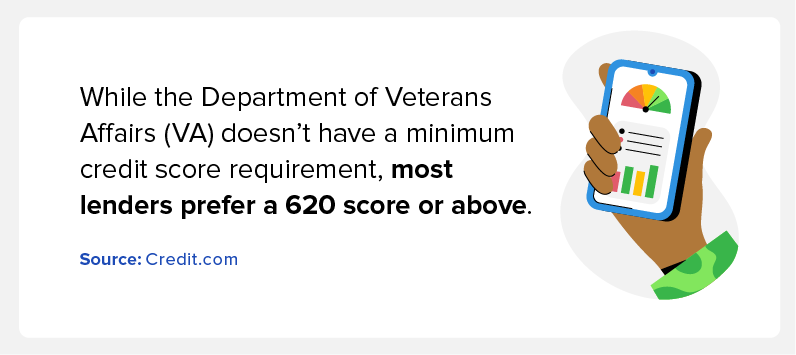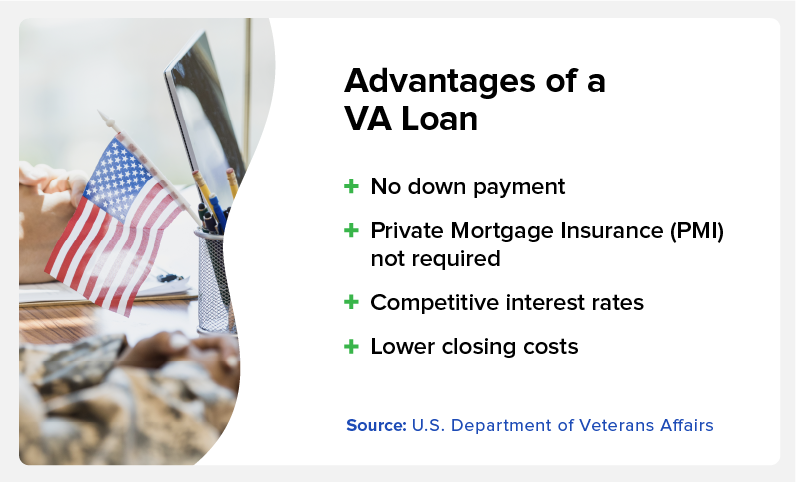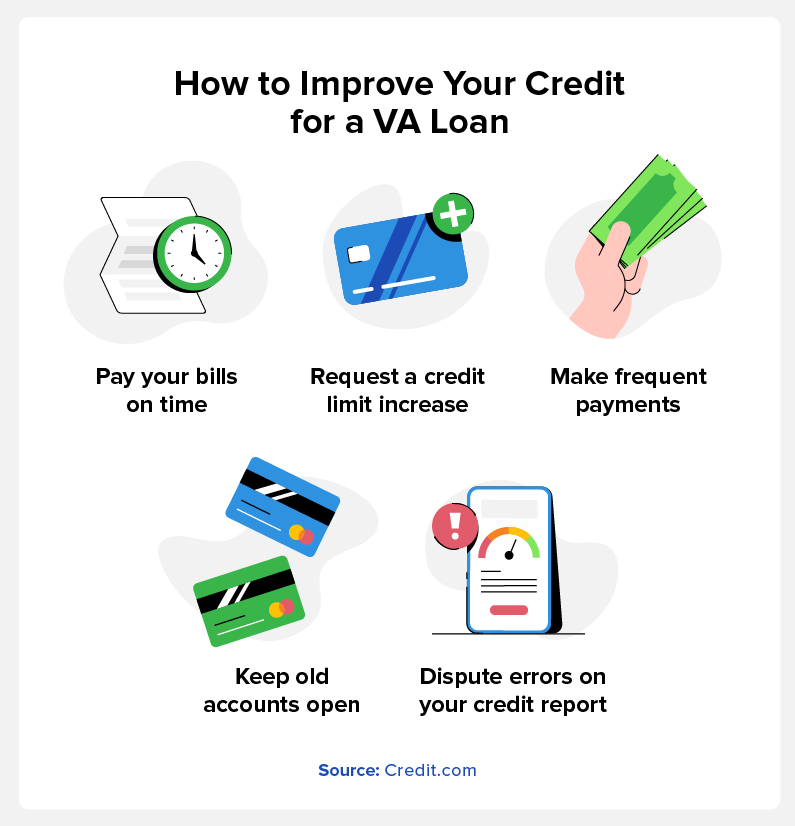
Many or all of the products featured here are from our partners who compensate us. This may influence which products we write about and where and how the product appears on a page. However, this does not influence our evaluations.
While there is no minimum requirement, most lenders prefer a credit score of 620 or above.
A VA home loan is a mortgage backed by the Department of Veterans Affairs (VA) for service members, veterans, and their families. The purpose of VA loans is to help veterans purchase homes with lower interest rates and better terms. While VA loans are typically easier to get approval for than conventional loans, private lenders still have certain requirements you must meet. One of these requirements is typically a good credit score.
However, the demands and sacrifices of military service can make maintaining a strong credit score a challenge. Read on to learn how to get a VA loan with bad credit.
Table of Contents:
- What Is the Minimum Credit Score for a VA Loan?
- Compensating Factors Your Lender May Take Into Account
- Other VA Loan Requirements
- How to Get a VA Loan After Bankruptcy or Foreclosure
- Who Qualifies for a VA Loan?
- What Are the Benefits of a VA Loan?
- Types of VA Loans
- Improve Your Credit to Qualify for a VA Loan
What Is the Minimum Credit Score for a VA Loan?
The VA doesn’t set a minimum credit score requirement because the organization doesn’t provide home loans. However, the lenders that issue the loans will often have credit standards prospective borrowers must meet. VA lenders generally look for a minimum credit score of 620. For comparison, conventional lenders also typically require a 620 credit score.
This requirement is flexible, and some VA lenders may approve borrowers with scores as low as 580.

Compensating Factors Your Lender May Take Into Account
Since there isn’t a minimum credit score requirement, other factors may help you secure a loan—even if your credit score is less than stellar. Known as compensating factors, these are financial strengths that counteract weaknesses in your application. According to the VA, compensating factors include the following:
- Limited use of consumer credit
- Little consumer debt
- Stable employment history
- Substantial liquid assets
- Significant down payment
- The existence of equity in refinancing loans
- Minimal or zero rise in housing costs
- Military benefits
- Positive prior homeownership track record
- Ample residual income
- Low debt-to-income ratio
- Tax breaks for child care
- Tax advantages of homeownership
Other VA Loan Requirements
In addition to your credit score, lenders typically have other financial requirements that help them determine if a borrower can qualify for a loan. Here’s an overview:
- Debt-to-income ratio: VA loan borrowers should aim to keep their debt-to-income (DTI) ratio under 41% for the best chances of approval. Use an online calculator to help determine your DTI.
- Residual income: The VA has requirements for residual income, or income left over after paying all your major expenses. The requirements vary depending on the loan amount and your geographic location.
These requirements are set by lenders, not the VA, so they may be flexible.
How to Get a VA Loan After Bankruptcy or Foreclosure
You can still qualify for a VA loan even after filing for bankruptcy or foreclosure, though you may be subject to a waiting period before you’re eligible. Here’s an overview of how to get a loan after foreclosure or bankruptcy.
- Chapter 7 bankruptcy: A Chapter 7 bankruptcy, known as “liquidation bankruptcy,” involves selling assets to pay off debts. The waiting period for a Chapter 7 bankruptcy is two years from debt discharge to qualify for a VA loan. In addition to satisfying the waiting period, you can’t have had any late payments or new accounts since filing bankruptcy.
- Chapter 13 bankruptcy: Known as a “reorganization bankruptcy,” a Chapter 13 bankruptcy involves creating a plan to repay the debt. The waiting period for a Chapter 13 bankruptcy is 12 months after filing.
- Foreclosure: A foreclosure is a process that occurs when a lender seizes a property after the borrower fails to make mortgage payments. The waiting period for a foreclosure is two years.
Who Qualifies for a VA Loan?
To qualify for a VA loan, you must meet the eligibility requirements from the Department of Veterans Affairs (VA). Below are the minimum active-duty requirements:
- Service members: Eligible if you served for at least 90 continuous days
- Veterans: Eligible if you served for at least 181 continuous days, although this may differ depending on when you served
- Reserve: Eligibility depends on when you served
- National Guard: Eligibility depends on when you served
- Surviving spouses: Eligible if you’re the surviving spouse of a Veteran including Veterans who are missing in action or being held as a prisoner of war (POW)
Note that those who have been dishonorably discharged are not eligible for VA loans. Check out the VA’s eligibility requirements for more information or to see if you qualify. If you meet the requirements, you can request a Certificate of Eligibility (COE) from the VA.
What Are the Benefits of a VA Loan?
VA loans provide many benefits you would not get with other loan types. These advantages include:
- No down payment required
- Competitive interest rates
- Private Mortgage Insurance (PMI) not required
- Lower closing costs

Types of VA Loans
There are different VA loan types to consider depending on your needs. Here’s an overview of each option to help you decide which loan type is right.
VA Purchase Loan
You can use a VA purchase loan to improve, buy, or build a home. While no down payment is required, putting money up front might help your chances of approval if you have low credit. Keep in mind that poor credit will likely result in a higher interest rate.
VA Native American Direct Loan (NADL) program
The Native American Direct Loan (NADL) is available to Native American veterans or non-Native American veterans who have a Native American spouse. You can use these loans to improve, buy, or build a home on federal trust land.
VA Interest Rate Reduction Refinance Loan (IRRRL)
An interest rate reduction refinance loan (IRRRL) allows you to refinance your existing loan to get a lower interest rate and, therefore, reduce your monthly payments. This is a good option for borrowers with low credit scores since it doesn’t require a credit check. Instead, lenders will look at the payment history for your existing loan to determine approval.
VA Cash-Out Refinance Loan
A VA cash-out refinance loan allows you to tap into your home’s equity to receive cash. Most lenders require a 620 score or above to qualify. You may need to pay a VA funding fee on a refinance.
Improve Your Credit to Qualify for a VA Loan
Even with a credit score under 620, eligible veterans can still get a VA loan. With a little time and dedication, you can improve your credit and put your VA benefits to use. Below are a few steps you can take to begin raising your credit:
- Pay your bills on time: Payment history is a key factor that contributes to your credit health. Consistently paying your bills on time will help raise your score.
- Make frequent payments: The amount of credit you’re using, also known as your credit utilization, impacts your credit score. Making several payments within the month can help you keep a lid on your credit utilization.
- Request a credit limit increase: Another way to lower your credit utilization ratio is by asking your credit card company for a credit limit increase. This only helps your credit if you keep the amount you’re spending the same.
- Keep old accounts open: Length of credit history is another important factor in determining your credit score, so avoid closing old accounts.
- Dispute errors on your credit report: Get a copy of your credit report and check for inaccurate information. Common errors include incorrect account statuses, inaccurate balances, and identity errors. If you find an error, file a dispute with the relevant credit bureau.

By checking your credit score, you can gauge your chances of getting approved for a VA loan. Get your free credit score today to see where you stand.
You Might Also Like
December 13, 2023
Mortgages






